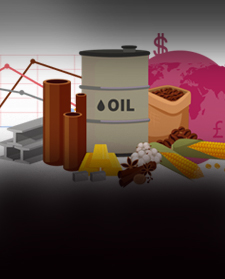
Advantage AxisDirect
- 20 investment products
- 3 great platforms to invest
- 5 fun-tastic learn courses
- 5 powerful research segments
- 4 prestigious awards
- 9 lakh+ happy investors
Quotes
Back To Menu
-
Offerings
- Overview
- Products
- Platforms - RING
- DIGITAX
- Managed Accounts
- Private Client Group
- Business Associates
- NRI
- REFER & EARN
- Insurance
- SGB
- Markets
- Research
- Learn
- PORTFOLIO
- PROFILE
Advantages and Disadvantages of Commodity Trading
Sep 22, 2022

Commodity trading has become one of the most profitable alternatives to capital market investments. It is typically executed as futures contracts on a commodities exchange. Several factors influence commodities pricing.
In India, MCX (Multi Commodity Exchange of India Limited) and NCDEX (National Commodity and Derivatives Exchange Limited) oversee and control commodity market trading. To trade a commodity online, you need a trading account.
The commodities market has several advantages and disadvantages. On the one hand, it offers profitable opportunities, while on the other hand, it is considered a high-risk, high-reward investment. Thus, too many commodity investments in your portfolio could be risky.
Here’s a discussion on the advantages and disadvantages of commodities trading to help you decide and calculate your risks.
Advantages of Commodity Trading
Hedging
Commodity trading could be the perfect option if you intend to hedge your stock and bond investments. This is because historically commodities and stocks or bonds move in opposite directions. For instance, if a particular country has gone into recession, investors could feel apprehensive and pull their money from stocks or bonds to place them under safe havens like gold or silver.
On the other hand, if the economy improves and companies start posting attractive profits, investors might avoid gold or silver and shift to equities. Hence, commodities in your portfolio can help you hedge your risks to maximize your profits.
Inflation
In simple words, inflation means an increase in the prices of commodities. So, if the price of a commodity in your portfolio increases, your portfolio value will also increase, resulting in the purchasing power being the same as the inflation rate. Thus, keeping some commodities in your investment portfolio can help you reap market upswing benefits.
Stocks and bonds usually decline with a rise in inflation because it lowers the liquidity and subsequently the purchasing power. Interest rate rises in such an inflationary environment, thus, increasing the cost of borrowing. As a result, the company's net income declines. A decline in the company's net income also impacts the distribution.
Hedge against risky geopolitical events
Geopolitical events such as war or riots lead to a supply chain bottleneck, resulting in the scarcity of resources. Supply chain issues make it challenging to procure and transport raw materials to the factories and manufacture them into finished goods. In these cases, a mismatch of demand and supply causes an exponential rise in commodity prices.
Liquidity
Like stocks, commodity investments are pretty liquid investments since you can sell them at your will, compared to static investments like fixed deposits or real estate.
Disadvantages of Commodities trading
The advantages of commodity trading make it a lucrative investment avenue. However, you also need to be aware of its downsides, some of which are:
High Leverage Option
On the surface, leverage appears to be beneficial to commodity traders, but if not used judiciously, it could cause trouble. The initial margin requirement for commodity trading is low, so you can take a large position with minimum upfront capital. Even the slightest price change can impact your profit/loss. Also, a low margin requirement can entice you to take a large, risky position, resulting in significant losses.
Extreme Volatility
Commodity prices are highly volatile because they depend on demand and supply factors that are relatively price inelastic in the short run. The direct exposure of commodity prices to geopolitical tensions and natural disasters makes them more volatile than stocks and bonds. Such occurrences like natural calamities or disasters lead to supply shock for several commodities resulting in a sudden increase in prices. On the other hand, an economic disaster can lead to diminished demand for energy, metals, and minerals leading to a sudden decline in prices. Sometimes, the volatility can be too sharp to wipe out an investor’s portfolio.
Conclusion
Commodity markets can open a lucrative avenue for investors and help them diversify their portfolios beyond stocks and bonds. However, you can reap the benefits of commodity trading if you know its disadvantages and plan your moves accordingly. Instead of emotions or impulses, you need to base your commodity investment decisions on facts and strategies.
Start off your commodity trading journey with Axis Direct: here.
Related Keyword
Advantages
MCX
NCDEX
commodities
Similar Articles

Inflexion Point: Concept In Commodities Market | Commodity Derivatives – Axis Direct
Dec 05, 2018 | Source: www.thehindubusinessline.com

A Millennial’s Guide To Commodity Derivatives – Axis Direct
May 10, 2019 | Source: www.moneycontrol.com
Show more...




 India
India NRI
NRI


